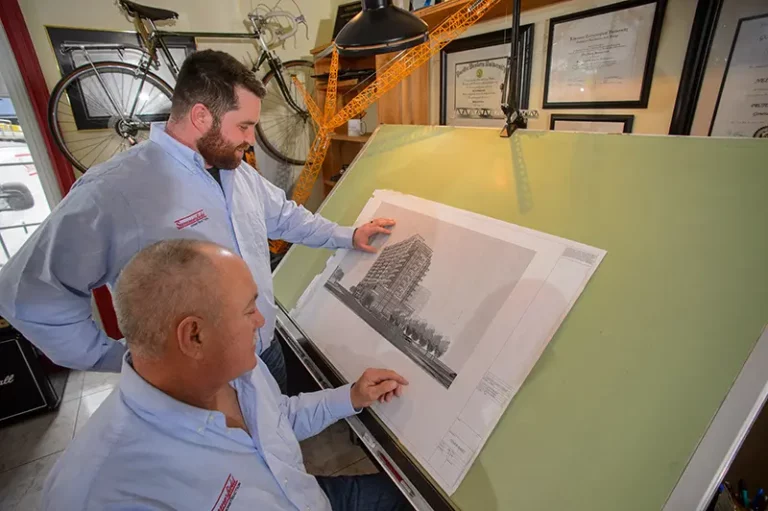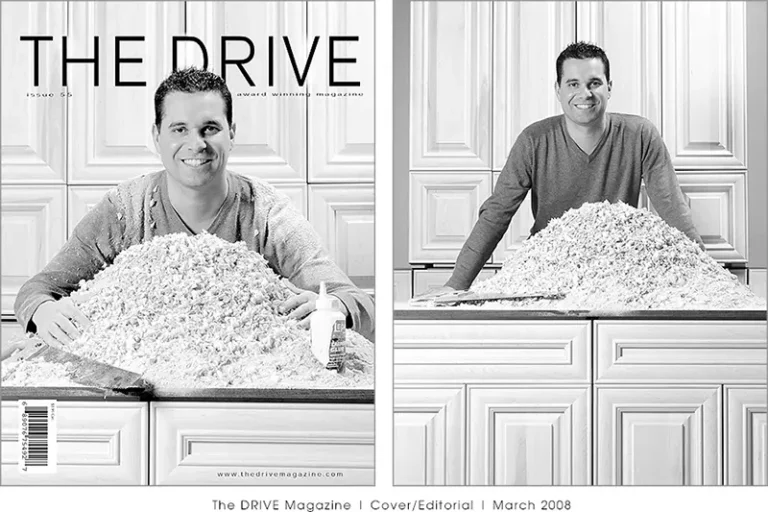Vincent Georgie is a yes person—all caps, risk-big-to-win-big, Y-E-S.
If not for his fearless mentality, the Windsor International Film Festival (WIFF) wouldn’t be the same festival we know today. No, Vincent isn’t the founder of WIFF, but as a friend once described him, Vincent is like jumper cables—you could take something with no energy or animation, clip Vincent on, and it will come to life. The minute Vincent sets his mind to something, it’s going to be a wow.
Vincent joined the WIFF board of directors 10 years ago, when the organization was searching for someone with a marketing background. Vincent has a doctorate in the business of film, so you could say he was perfectly qualified for the position. “I’ve always known that WIFF would be a big hit, no doubt about it. Did I ever think about the role WIFF would play in my life, or how long I would stay? No, I just couldn’t have,” Vincent says, remembering a time when he didn’t know much about film festivals, which isn’t the case now. He jokes that his life from now on will be inextricably linked to the festival. As WIFF’s current executive director and chief programmer, Vincent can’t walk through Zehrs without people giving him film recommendations.

“One time someone came up to me, knowing that I’m a film buff, and he said, ‘Well, let me tell you about our film festival.’ And I was fascinated with what he was about to tell me. I was so delighted, but I didn’t say anything because it was so authentic, and he was giving me the most genuine recommendations. At the end I just told him, ‘You’ve sold me. I can promise you that I’ll be there this year.’
“I think it’s marvellous that our audience is so engaged and cares about the festival and feels proud of it,” he adds.
Originally from Montreal, Vincent was an outsider to Windsor. He says that it actually helped that he came from out of town, because he didn’t fall into the old Windsor stereotypes or labels and wasn’t afraid to push the community further.
Back in his early days with WIFF, Vincent recalls working with distributors and asking them to acquire an edgy film. Their response? ‘But Vincent, I’m not sure if this film will work in Windsor. It’s too serious. Sophisticated. There are subtitles.’
The discomfort zone
This response triggered Vincent’s chief motivation for how he works: trying to shake people out of their comfort zones. Refusing to take no for an answer, he responded with, ‘We will decide what we like, and they’ll love it just fine!’ Lo and behold, today it’s a role-reversal for both him and WIFF.
“Now our distributors marvel at how progressive our audience is,” he says. “For me, if you show people that it’s a good movie, they will go see it.”
Vincent brings a “more is more” flavour to the festival. Even in life, he is not at all attracted to moderate risk for moderate reward. “My family is a go-above-and-beyond one, and we reach the extraordinary. You have to be confident in your abilities and be realistic about it, but I’m fine with a high level of difficulty of execution. I have an appetite for high-wire acts that are difficult to pull off, because you know that if you do, it’ll be a wow,” he says.
The same goes for his taste in films. “I always lean in to a film that’s risking something, where the result could have been catastrophic, but instead, it nailed what it was trying to do.”
Vincent doesn’t do “medium”. It’s huge or it’s nothing. He’s up early, he’s up late, he’s taking to you on the phone but he’s also emailing you and somehow he’s also right beside you drinking his ninth coffee of the day.
—Pat Papadeas
The early years
Vincent is naturally attracted to very heavy films, with his favourite being Zodiac. For him, it’s impossible for a good film to be “depressing,” and he’s never understood the discourse around the idea that a film could look too heavy or depressing. “A depressing movie is when I walk out of the theatre and can’t remember what I saw,” he says. “Anything that leaves you with something can’t be depressing.”
Vincent remembers the day he fell in love with movies. “I was looking through the newspaper in our family home and found a beautiful poster ad for the film Dangerous Liaisons. I remember looking at that photo of Glenn Close, John Malkovich, and Michelle Pfeiffer and thinking, I want to know more about movies.”
He began asking for Leonard Maltin’s annual film review books for Christmas, and since Vincent has a photographic memory, he could easily memorize statistics and facts about the Oscars and retain all of the information. The more he read about the industry, the more fascinated he became with knowing everything. Going into the “business of arts” wasn’t de facto; this is just what Vincent has always wanted to do.
“When other kids were off playing sports, he was reading Oscar almanacs,” says James Docker, a childhood friend of Vincent’s. “I knew from the day he went to Windsor for his MBA, that he’d move back to become a professor. It’s not a surprise that he’ll never leave.” Windsor was an anchor point during the formative years of Vincent’s life, and even though Vincent grew up in Mississauga, it just took him a little longer to realize that his true home is Windsor.
“Vincent immerses himself in what he believes in and truly loves what he does,” James adds. “These things are synonymous with Vincent: he’s loyal to his friends, his brands, and his passions.”

The marketing angle
Vincent watches around 600 movies a year—both related to WIFF and not—and says that as much as he’s watching them as a business-minded person, he is simultaneously enjoying the experience as an audience member. “When we found The Russian Five in Traverse City, which wound up winning People’s Choice awards, I was moved and teared up frequently. Even while teary-eyed over the content, I couldn’t help but think, ‘How are we going to market it?’ or ‘When are we going to schedule it?’” Because he’s a marketer first, he’s able to separate church and state, and there’s a clear understanding between his taste versus the market taste.
He researches film every day of his life, without fail. He and his team have an ongoing WIFF spreadsheet that he checks multiple times a day. He says that they find some WIFF films up to a year and a half in advance, while keeping the programming cut-off date very close to the launch. They want the maximum amount of time to go out and find that needle-in-a-haystack film. It’s their goal to make sure the festival contains something for everyone in the community.
“We’re trying to paint a giant portrait of what WIFF will look like, and we’ll keep adding films in brush strokes, look back, and think, this is too grey, too Canadian, not local enough. We keep going back until we get to the point, look at it, and say, ‘YES! It’s got the flavours we want: diversity, countries, local, serious, political, challenging, whimsical, and terrifying.’”
Vincent says these are the true pleasures of running an audience-focused festival. It’s the audience’s year-round feedback that has made WIFF the number-one volunteer-run festival in Canada for 2019, and on the same year as WIFF’s 15th anniversary.
Windsor’s buzz
The festival adds a quality of life to Windsor, as our downtown core buzzes with “WIFF Chaos,” as labelled by an ongoing festivalgoer. Part of WIFF’s charm is that it’s a collection of 45-second conversations with the entire city in between films. Vincent says that the actual film is often the third consideration for some viewers, with the first being a big crowd or that feeling of a group experience.
“For me there’s terrific satisfaction when I’m outside the theatre and listening to people give feedback as they walk by. I stand off to the side, trying to catch what they say. It’s like giving someone a Christmas gift that you love, and thinking, oh my god, I bought that for you a year ago and I’m so happy you ended up liking it.”
Back when WIFF brought the Chrysler Theatre on as one of the locations, he caught someone say, ‘It’s so convenient, you just cut through WIFF Alley.’ He and the WIFF gang were blown away by their audience referring to the alleyway between University Avenue and Chatham in that way. Naturally, his marketing brain took action and this year they’ll be transforming “WIFF Alley” into an arts and culture hub filled with special guests.
Being open to the positive and negative feedback, and implementing the changes, is what takes WIFF above and beyond most film festivals.
“The audience said give us another weekend, so okay, we’re doing it. We’ll do 10 days, three venues, 40,000 tickets, and 170 films. A festival of this size should be in a city roughly the size of Ottawa. The fact that it’s here… wow,” Vincent compares today’s numbers to the 2,500 tickets sold in the early years.

The growth phase
Now that the festival is this size, Vincent and the WIFF team actually have to be less risk-averse because they have room to play. They can show a film that they really believe in, that was expensive to acquire, and have 27 people show up for it, because there will be another film that will sell 2,000 tickets. “The films can live together in the ecosystem and it will go well, compared to when we were smaller and had fewer spaces to make revenue,” he says.
Jennifer Willet, an associate professor at the School of Creative Arts (SoCA), says that Vincent has begun collaborating between her lab and WIFF. Jennifer’s “INCUBATOR” lab intersects biology with the contemporary arts, and this year she and Vincent are exploring how to heighten the movie-watching experience by engaging a hands-on experience of the biotech featured in one of the films.
Jennifer speaks to his ongoing efforts to enliven the city and festival, both professionally and creatively. “As director of SoCA, Vincent has been a great champion of the program. He is an optimist but also works towards these goals with an incredible internal momentum.”
There’s no rest on the lulls for the hardworking WIFF team, because they’re constantly looking for improvements to make to the festival.
Behind-the-scenes: WIFF
In the month leading up to the festival, WIFF meetings become seven to ten hours long. Vincent says they add in a little fun and comfort by conducting meetings at someone’s house and bringing food. “WIFF-planning becomes a full-contact sport, in the best way. They last forever and a day, and even when we do finish, a group of people will stand at the doorway with their coats on and have another two-hour meeting. It just continues to break up into smaller meetings on the porch, and then we’ll have the subcommittee throwing it down for 40 minutes in someone’s car.”
He adds it’s important for everyone involved to have supportive friends and family during this time, to understand the commitment and energy it takes to put this beast together. The long hours don’t bother him, because he’s always wanted a career over a job, and it all comes down to his relationship with time. It never occurs to him that he works on a Saturday, or that he shouldn’t.
“When you have a job, you’re always counting down until it’s over,” he says. “Why wouldn’t I work on this? Last night I was in my office until midnight. University work? Love it. WIFF work? Love it. There’s no shortcut to getting the job done, you just do it. It’s not more magical than waking up early or going to bed late.” This is his life’s work, and he does it because he loves it.
Vincent has always valued knowledge and expertise, so it’s on brand for him to know the film industry inside and out. “Good or bad, I’m an expert in my industry. Back in the day I saw all of the Twilight films because I needed to know what this trend was in my industry. It’s like saying you’re a car expert but you’re not up to date with the new cars. So… you’re not an expert then.”

Behind-the-scenes: Vincent
Since so much of Vincent’s life tends to be grand, naturally people are drawn to the mundane facts about him. “I’m more introverted than people think. I have to recharge and be plugged back into the wall. I’m very good at taking long road trips in silence,” Vincent tells me.
He doesn’t cook, he is an insomniac, he gets a lot of parking tickets, he has delayed motor skills, he can’t snap his fingers or whistle, he failed his driver’s test four times. “My mind gets things faster than my body. I’m the type that if my dishwasher broke, I’d sell my house. It could be a quick fix with an eight-dollar part at Home Depot but I wouldn’t know what to do with it. Nope, it’s done.”
Vincent’s living requirements include needing to be within proximity to a Starbucks, because coffee is his go-to thinking beverage when watching a film. He also says that he approaches every meeting and every email assuming that he’s going to agree. “I say no about one out of 10 times, when I know it will be problematic. But if I say yes, it’s because I know it will be generative and something good will come out of it.”
Most people overplay the consequences of an action, but when Vincent looks at a situation, he realizes the worst that could happen is it ends in “meh.”
“If the worst case is ‘meh,’ but the best case is that it’s wonderful and makes people happy, well then, why wouldn’t you try?”
By saying “yes,” he hopes that people will remember him as “the guy who did it.”
Whatever it is, he’ll have done it.
WIFF will be screening movies from NOVEMBER 1 – NOVEMBER 10, 2019 Tickets are available online here.



